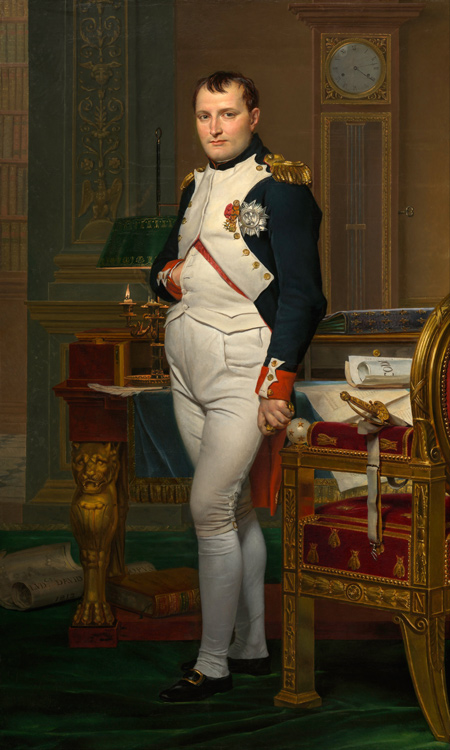In Paris, Minister to France, Robert Livingston, is shocked when French Minister of Foreign Affairs, Charles-Maurice de Talleyrand, tells him that Napoleon wants to sell the whole Louisiana colony. His brothers try to change his mind. The outcome would directly affect Jefferson’s Western Expedition.
Livingston is Shocked
Paris, April 11, 1803
Dear Sir [James Madison]:
M. Talleyrand asked me this day, when pressing the subject, whether we wished to have the whole of Louisiana. I told him no; that our wishes extended only to New Orleans and the Floridas; that the policy of France, however, should dictate (as I had shown in an official note) to give us the country abov the river Arkansas, in order to place a barrier between them and Canada. He said, that if they gave New Orleans the rest would be of little value; and that he would wish to know ‘what we would give for the whole.’ I told him it was a subject I had not thought of; but that I supposed we should not object to twenty millions [francs], provided our citizens were paid. He told me that this was too low an offer; and that he would be glad if I would reflect upon it and tell him to-morrow.
Your most obedient humble servant,
R. R. Livingston[1]Livingston to Madison, 11 April 1803 in American State Papers, Class I. Foreign Relations, 2:552 accessed at https://archive.org/details/sim_american-state-papers_may-19-1797-december-24-1806_2 on 4 … Continue reading
The Consular Bathtub
Talleyrand had no authority to negotiate Louisiana as described above. That task had been assigned to Barbé de Marbois the previous day, 10 April. James Monroe biographer Harry Ammon suggests Talleyrand was “acting as a marplot to confuse or delay negotiations long enough to convince Napoleon to retain Louisiana.”[2]Harry Ammon, The Quest for National Identity (Charlottesville: University of Virginia Press, 1990), 209.
Napoleon’s two brothers, Lucien Buonaparte and Joseph Buonaparte, opposed the rulers’ decision and confronted him in his bathtub. After stating their opinions, Napoleon was incensed. Translating from Lucien’s memoir in a chapter titled “Le Quos Ego de La Baignoire Consulaire” (The Quos Ego from the Consular Bathtub), historian Henry Adams describes the iconic scene:
You are insolent! I ought—” then [he] threw himself violently back in the bath with a force which sent a mass of perfumed water into Joseph’s flushed face, drenching him and Lucien, who had the wit to quote, in a theatrical tone, the words which Virgil put into the mouth of Neptune reproving the waves,—
“Quos ego . . .”[3]Henry Adams, The History of the United States of America during the first administration of Thomas Jefferson (New York: Charles Scribner’s Sons, 1921), 494.
Son of Corsican official and revolutionary, Napoleon (1769–1821) was sent to France as a young teenager to become army officer. Gifted in mathematics, he chose artillery, welcomed revolution, was employed by various factions to control opposition, became member of ruling elite, and eventually First Consul in 1798.
Notes
| ↑1 | Livingston to Madison, 11 April 1803 in American State Papers, Class I. Foreign Relations, 2:552 accessed at https://archive.org/details/sim_american-state-papers_may-19-1797-december-24-1806_2 on 4 May 2022. |
|---|---|
| ↑2 | Harry Ammon, The Quest for National Identity (Charlottesville: University of Virginia Press, 1990), 209. |
| ↑3 | Henry Adams, The History of the United States of America during the first administration of Thomas Jefferson (New York: Charles Scribner’s Sons, 1921), 494. |
Experience the Lewis and Clark Trail
The Lewis and Clark Trail Experience—our sister site at lewisandclark.travel—connects the world to people and places on the Lewis and Clark Trail.
Discover More
- The Lewis and Clark Expedition: Day by Day by Gary E. Moulton (University of Nebraska Press, 2018). The story in prose, 14 May 1804–23 September 1806.
- The Lewis and Clark Journals: An American Epic of Discovery (abridged) by Gary E. Moulton (University of Nebraska Press, 2003). Selected journal excerpts, 14 May 1804–23 September 1806.
- The Lewis and Clark Journals. by Gary E. Moulton (University of Nebraska Press, 1983–2001). The complete story in 13 volumes.


